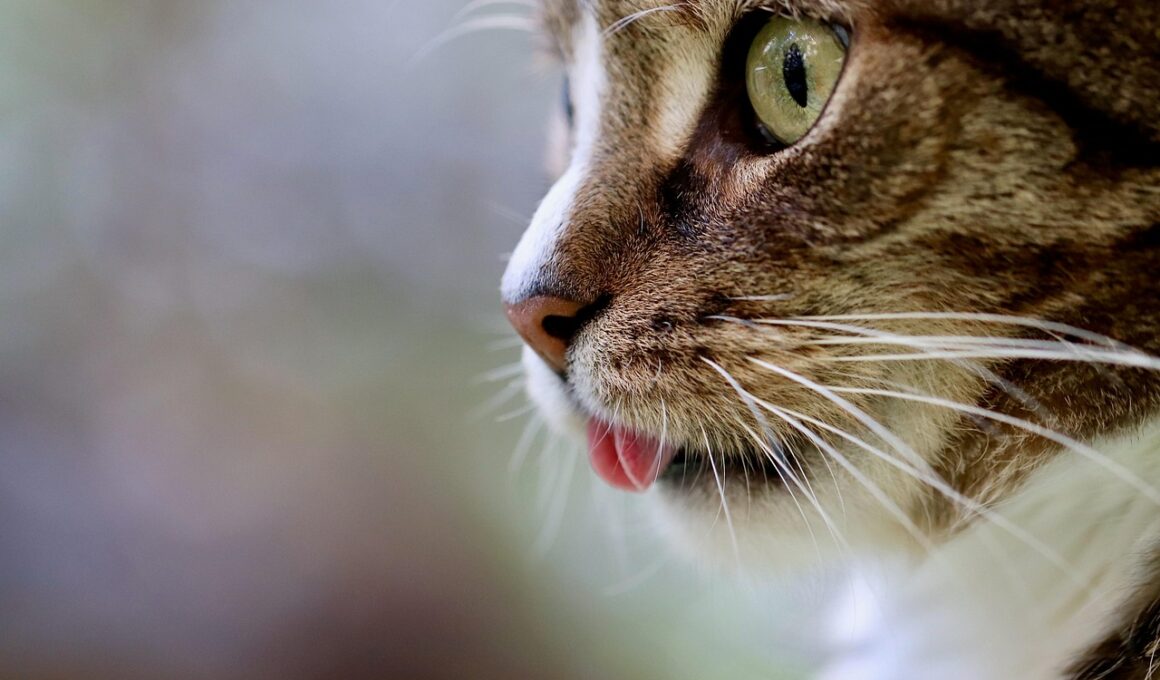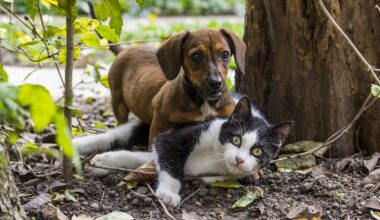How Antioxidants Support Cognitive Function in Aging Cats
Aging cats often face various cognitive challenges, similar to conditions observed in aging humans. One way to potentially mitigate these cognitive declines is through the inclusion of antioxidants in their diet. Antioxidants help combat oxidative stress, which can damage brain cells and impair cognitive abilities. These nutrients are critical because they neutralize free radicals, offering a protective effect on the central nervous system. Some of the most effective antioxidants for feline health include vitamins C and E, taurine, and certain phytonutrients. Research suggests that a diet enriched with these compounds can support brain health and improve cognitive function in senior cats. Enhancing your cat’s diet with antioxidants may also lead to improved memory and overall mental agility, greatly enriching your pet’s quality of life. Additionally, formulaic blends of antioxidants and omega-3 fatty acids show promising benefits in supporting cognitive longevity. As you consider dietary options for your aging cat, it’s essential to consult with your veterinarian to ensure your pet gets the right balance of these nutrients, tailored to their specific needs.
Modern veterinary research emphasizes the importance of dietary antioxidants for promoting mental clarity in elderly cats. Aging cats can suffer from cognitive dysfunction syndrome (CDS), which significantly affects their quality of life. Common symptoms of CDS include disorientation, disrupted sleep patterns, and changes in interaction. Antioxidants play a vital role in mitigating such symptoms by supporting synaptic plasticity, which is essential for learning and memory. Moreover, these nutrients can help in reducing inflammation in the brain, further promoting mental health. Regular inclusion of foods rich in antioxidants, such as blueberries, spinach, and carrots, can contribute positively to your cat’s cognitive performance. These superfoods are not only nutritious but also safe for feline consumption. Incorporating such foods into their diet can be a tasty treat that delivers essential health benefits. Pet parents can also consider high-quality commercial cat food formulated with antioxidants specifically designed for older cats. It’s a convenient way to ensure a balanced intake of these critical nutrients while also enjoying the flavors they love. Furthermore, monitoring your cat’s behavior and mental activities can help gauge the effectiveness of dietary changes.
The Role of Taurine in Cat Supplements
Taurine, a sulfur-containing amino acid, is another powerful nutrient often included in cat supplements. It plays a multifaceted role in the overall health of felines, particularly in relation to cognitive function. Taurine has neuroprotective properties, which means it safeguards neurons from damage and helps maintain normal brain function. This becomes increasingly important as cats age, as their natural taurine levels may decline. It has been shown that elderly cats benefit from taurine supplementation due to its ability to stimulate brain activity and enhance memory. Moreover, taurine supports cardiovascular health, which is essential for maintaining proper brain function. When considering antioxidants for your aging cat, don’t overlook the value of taurine-rich supplements. Many commercial cat foods now feature increased taurine to foster cognitive health and reduce the aging process’s neurodegenerative impacts. Always verify that the supplements you choose are designed for felines, as some human supplements may not be safe for our pets. Consulting with a veterinarian can provide specific guidance on how much taurine your cat needs based on age, weight, and overall health.
Antioxidants can also play a preventive role in neurodegenerative diseases that may afflict aging cats. Much like in humans, the prevention of cognitive decline is just as crucial as treating existing conditions. Regularly incorporating antioxidants can help maintain optimal cognitive function and reduce the risk of issues such as Alzheimer-like symptoms in felines. Doctor-whole food diets containing high levels of antioxidants are believed to bolster cognitive resilience and foster aging gracefully in cats. There are various ways to introduce these beneficial nutrients into your cat’s diet. As mentioned, whole fruits and vegetables are excellent sources, but in addition to incorporating these foods, it is essential to maintain a balanced diet composed of high-quality, nutritionally complete cat foods. Probiotics, along with antioxidants, can enhance gut health, further contributing to overall well-being. Products specifically designed for seniors often have a higher antioxidant content and can be identified on ingredient labels. Always remain proactive in ensuring your aging cat receives adequate amounts of antioxidants for improved cognitive longevity and quality of life.
Signs of Cognitive Decline in Cats
Understanding how to recognize the warning signs of cognitive decline in your feline friend is crucial. Just as humans experience memory lapses, confusion, and behavioral changes, cats can also exhibit similar symptoms. Common signs of cognitive dysfunction syndrome include alterations in sleep patterns, increased anxiety, and vocalization during the night. Another indicator is a change in your cat’s interaction with family members or surroundings. A once-social cat may suddenly seek isolation. These changes can emerge subtly, making it essential to monitor any peculiar behavior. If your cat has become disoriented and struggles with previously familiar spaces, it may warrant a closer look at their diet, particularly the antioxidant content. Additional signs include inappropriate elimination behaviors, where a cat might forget where their litter box is located. Regularly consulting with your veterinarian can help in early detection and management strategies. Early identification of cognitive decline can lead to interventions, including dietary changes incorporating powerful antioxidants, which may help maintain cognitive function and ensure your beloved companion keeps enjoying their golden years.
Incorporating cognitive-enhancing supplements is essential for promoting cognitive function in aging cats. Among these, antioxidants have gained popularity due to their neuroprotective effects. When examining ingredients, one may find that certain herbal extracts, such as Ginkgo Biloba and Rosemary, are included. These additions can provide extra support in terms of cognitive enhancement. Antioxidants sourced from these herbs can act synergistically with basic vitamins, creating a more robust nutritional profile. It would be beneficial for cat owners to research these compounds and how they can complement regular feeding regimens. However, before introducing new supplements, it’s vital to consult with a veterinarian to prevent potential interactions with medications your cat may be taking. Planning for an aging pet involves creating a holistic approach to health. Alongside enhancing diet, consider stress-reduction techniques and maintaining a stimulating environment. Physical exercise, puzzle toys, and social interaction contribute significantly to mental stimulation. Implement these aspects in tandem with a diet rich in antioxidants and observe how these beneficial changes affect your feline’s overall cognitive function.
The Future of Cat Nutrition
As our understanding of feline nutrition evolves, the importance of antioxidants will continue to gain recognition in pet care. Antioxidants serve as essential boosters for aging cats’ cognitive function, significantly influencing their quality of life. Ongoing research indicates promising results in how specific antioxidants lengthen cognitive health, making these compounds a focal point for future formulations. Companies that develop cat supplements and food are investing in research to create more effective products equipped with advanced understanding of nutrient interactions. This endeavor aims to enhance feline health, focusing on aging populations who require specialized care. With rising pet ownership, there is an increased demand for high-quality nutritional products catering specifically to older cats. Pet parents should stay informed about the emerging trends in cat nutrition and continue to evaluate product labels and research studies. Vet recommendations will be vital for ensuring that pets receive the best possible formulations designed with their unique nutritional requirements in mind. By staying up-to-date with advancements in our understanding of antioxidants and cognitive health, we can provide our aging cats with the utmost care and love they deserve.
In conclusion, the inclusion of antioxidants in the diet of aging cats is an effective strategy to support their cognitive function. These nutrients counteract oxidative damage and can profoundly influence overall mental well-being. By recognizing the importance of antioxidants, veterinary professionals and cat owners alike may foster a holistic health approach, improving the quality of life for aging pets. Whether through natural sources or supplemented products, ensuring optimal antioxidant intake may delay the cognitive decline that often accompanies aging. Monitoring feline behavior and health allows responsible pet owners to adapt to their pets’ evolving needs. Further, as the pet nutrition industry continues refining products aimed at senior felines, innovation will undoubtedly enhance the lives of our beloved companions. Taking proactive steps like seeking specific dietary formulations that prioritize antioxidants could lead to happier and healthier feline lives. Enhancing the daily diet with a diverse array of antioxidants further enriches each meal and offers flavors that satisfy their palate. Aging cats can thrive and remain mentally engaged with supportive nutrition, ensuring they enjoy their later years with joy and vitality.


